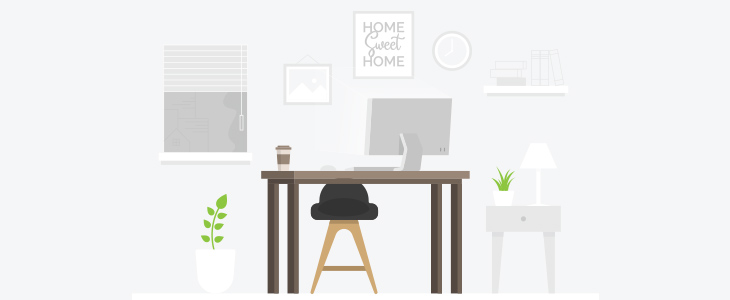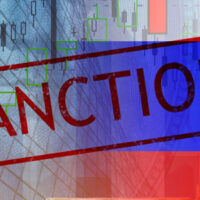
Monday through Friday is drastically different now for a large percentage of people both in the U.S. and around the world. More people are under some type of mandated quarantine today than there were people alive in 1940—2.6 billion.1 Most, if not all, of you are working from home (WFH) as well as practicing social distancing to both slow the spread of and dodge getting sick with COVID-19. To all the first responders, nurses, doctors, law enforcement and others on the front line of the fight against the virus: We salute you. This gratitude also extends to the often unsung heroes—the retail workers behind the cash registers, stocking the shelves and making deliveries. You are the reason we still have food and other necessities. Thank you.
For the rest, our main priority has been to create and maintain a normal work routine and stay productive remotely. On top of that, we are worrying about keeping our children safe, sound and active indoors, diligently searching for supplies like food and toilet paper, or continuing the job search and interviewing without ever being in the same room with those asking the questions. We are in interesting times, to say the least.
My job as a recruiter is tethered to the state of the economy. Good economy equals more jobs and vice versa. Thus, I am grateful to have come up in the recruiting industry during the Great Recession. I learned the fundamental value of recruiters, learned how important grit is to true success and accomplishment, and learned how easy it is to go from something to nothing (and not vice versa). Most importantly, the Great Recession prepared me for all economic downturns to come. It gave me a reference point and lessons for navigating the current rough waters. The silver lining with the current economic decline is that it does not stem from a fundamental flaw in our economy. The Great Recession was the result of an overabundance of financial recklessness, avarice and imaginary credit. The economy was the virus. Now, the economy is sick with the flu (figuratively speaking) and is incapable of functioning normally. While there is no timetable for a return to normalcy, there will be an end. As a species, our survivalist genes turn on in times of uncertainty. In addition, the global economy is always negatively impacted when we experience uncertainty collectively and are more focused on staying alive than on living.
In my daily conversations with job seekers and hiring managers, I have felt and observed a rejuvenating peace of mind with our current circumstances and a new normal. As we get closer to normalcy, there will be a recruiting feeding frenzy as companies reorient their focus back to old (and new) business goals that require strong talent and bodies. This is not to say companies are not still hiring and interviewing, but there has been a precipitous decline in new opportunities and in the pace of interviewing and offers. When would new hires be able to start?
I have had a lot of time to think, speak to members of our compliance and anti-money laundering community, and observe how my job, our jobs and the employment market has changed and might change in the long term. The following are my current takeaways from my time under COVID-19 quarantine.
Observations, Thoughts and Predictions
WFH and 100% Remote Access Will Become a Standard Feature Rather Than a Perk or Alternative to Being in the Office
Have you noticed that you are working more hours a day now than before quarantine? By removing the need to commute, some employees might have anywhere from one to two more hours of productive work time. While companies may initially be wary, having employees WFH leads to added productivity. Some might say the logistical hurdles of scheduling remote calls and corralling all the necessary parties adds more work and inconvenience but this inefficiency should disappear once the population grows accustomed to 100% remote work and as technology continues evolving to solve current problems. This is not to say that offices do not have major benefits beyond allowing supervisors to supervise. There can be nothing more inspiring than being around your most creative and successful colleagues and we can escape hectic and overwhelming households. However, WFH will lose its novelty and become an expected feature of most companies following the long-term quarantine.
Enhancing Business Continuity Plans Should Become the Center of Attention When Normalcy Returns
I cannot count the number of senior executives who were flabbergasted by the lack of preparation for quarantining and social distancing. Setting up remote access, virtual private networks, tokens, disseminating hardware, and deciding who was allowed remote access and who was a security risk turned into a logistical nightmare. Business unit leaders, information technology departments and most employees spent more time figuring out how to get work done than getting work done.
Business continuity plans (BCPs) should be more than words on paper. BCPs, disaster recovery, and operational risk experience and talent should be in high demand when the world transitions from fighting COVID-19 to recovering from its impact.
The Precipitous and Sudden Economic Decline Will Soon Expose Cases of Fraud and Illicit Activity
Even Bernie Madoff could not evade the Great Recession. His case is the most dramatic and extreme, but the Great Recession brought to light many a Ponzi scheme and fraudulent activity. Law enforcement regularly take down fraudsters in a good market, but implosions in the financial markets and pandemics are kryptonite to the greatest of white-collar criminals. Economic downturns compel both legitimate and shady companies to clean house as well as assess internal operations and conditions. Corporate self-adjustments during bad times lead to whistleblowing, self-disclosures of malfeasance, unexpected bankruptcy and criminal enterprises losing the ability to cover their tracks with additional investments and accounting hocus-pocus.2 In my opinion, we are not going to experience another 2008. However, we could see similar outcomes to a lesser degree. The economic decline should lead to a gold rush for law firms, management consultants, advisory firms and staffing firms in the long term.
COVID-19 is Catalyzing Current Trends in the Banking Industry and Will Push Them Along Dramatically
Since 2012, retail and commercial banks have been closing branches at a faster pace around the U.S.3 Digital banking and consolidation in the industry have been the primary factors. Now, banks are shutting down thousands upon thousands of branches in an effort to stop the spread of COVID-19. What are the chances that all of these branches will return to business as usual and be fully staffed? Currently, most financial transactions can be conducted online without changing out of sweatpants. With humans being creatures of habit and real estate being a large amount of overhead, digital banking will become a go-to for both banks and their customers.
The Commercial Real Estate Industry Will Decline and Office Space Will Become Less of a Necessity
This prediction is tied to the last observation, but it deserves some recognition because of its potential impact on our consumer culture, retail sector employment and working culture in general. Rent, especially in cities, is the largest amount of overhead for a great number of companies, both large and small. I bet every CEO is cringing over the amount they are spending on rent for empty office space combined with the technology required to maintain remote access for tens, hundreds and thousands of employees. In the long term, which expense is more crucial to company success: real estate or bandwidth? Then there is the retail sector. What are storefronts going to look like when we start leaving our homes again? There was already an increase in online purchasing of consumer goods—from clothes to food—over going to bricks-and-mortar shops before COVID-19. For the time being, I have been purchasing 100% of my essential items online with 100% success and convenience. I signed up for subscriptions and reoccurring purchases of shaving razors, carbon dioxide canisters (I love seltzer), baby formula and other items. Personally, I am never going to a store for those items unless I must. Millions of people with access to Wi-Fi and no desire to risk being around strangers are doing the same.
Virtual Activities Will Enter a Renaissance
Now that we are subjected to always being at home, it seems every facet of our daily routine has developed a digital counterpart. Work routines are no exception. Countless people are conducting business meetings on conference and video calls now. Our connection to those close to us (both personally and professionally) must be preserved, so the vast array of available teleconferencing platforms is worth investing in, even though it may seem overwhelming to those unfamiliar. Soon, most of us will be accustomed to asking whether to use Zoom, FaceTime, BlueJeans or Skype. (Is it me or is Zoom the company that benefited the most from COVID-19?)
Our off-hours will change as well. How many Netflix, Amazon Prime, Hulu, Disney+, Apple TV+ (wow, I have too many subscriptions) shows and movies have you been able to cross off your watch list? How many virtual happy hours have you had? Have you actually been exercising more during the quarantine and using virtual instructors and YouTube videos? Personally, I am looking forward to seeing the activities Martha Stewart suggests during her next television special. Self-quarantining is forcing us to find creative sources of entertainment and socializing. One of my favorite clients recently said that the people best suited to get through the quarantine are those who both experienced the Great Recession and have done jail time. These people learned both how to survive the worst economic situation of our generation and how to stay active under forced social distancing, limited living quarters and next-to-no time spent outdoors.
Human Resources Departments Have Been Vital and Indispensable During This Whole Ordeal and Will Be Held in a Higher Regard
The human resources (HR) team at my company was fantastic at the beginning of the transition to WFH. They communicated with us constantly, consistently and always had answers, even to questions we had not asked yet. They gave us proactive instructions regarding what we should do regarding upcoming and recently completed vacations, allowed us to change our commuter benefits, responded quickly and with confidence when I reached out to them directly, and have made me and my colleagues feel empowered. I would keep this point to myself, but I have heard similar experiences from candidates, clients, friends and family without even broaching the topic. They were volunteering their positive opinions of how their respective HR teams were guiding them through this ordeal. Hopefully, we do not go back to making the same old, “Everyone act calm, HR arrived!” jokes about our HR colleagues when they show up to future company happy hours.
We Will Be More Grateful for What We Have While Striving for What We Want and Do Not Have
As I have grown older, I have become more drawn to staying at home. Streaming movies and ordering takeout on a Friday—after a long week at work—sounds more exciting than happy hour drinks these days. Combined with having a three-month old baby boy, I have proudly adopted the official title of homebody. I am telling you this because I practice active gratitude (also known as optimism, finding your silver lining, finding your inner Buddha, etc.), which helps me stay positive and tempered at all times. As of April 2020, we are in the midst of our first truly global public health scare, and our lives and daily routines have changed dramatically. To stay sane in the present, rely and depend on all the good parts of your life. Think about your family, friends, the four walls and a roof you call your home, your bed, clean drinking water, food, books, streaming movies and television shows (and my articles, of course). You should expect a mysterious few months ahead with an uncertain economy and tough government restrictions. When I get scared and anxious, I remind myself that I am lucky and have the guts to deal with everything that comes my way. I also go down my list of gratitude.
First, I am grateful that my son was born before the outbreak and state of emergency. Second, I am grateful that having a newborn helped me adopt a routine that acclimated me to self-quarantining and social distancing easily. Third, I am grateful for technology; I can speak to my mom, sister, friends, colleagues and clients—all at the same time if I wanted! Finally, I am grateful that this too shall pass.
Next time you apply hand sanitizer, go to your sink for clean drinking water, take a hot shower, open your fridge to grab a bite or use technology to speak to your loved ones, thank the universe for how lucky you are and what you have. We all have different ways and abilities to cope with huge and sudden life changes. At the very least, we will all come out the other side of this experience with a greater understanding of and more tools to cope with the inevitable public and personal events the future holds.
- “Fintech to the Rescue?” Fintech Collective, March 28, 2020 https://us3.campaign-archive.com/?u=e0d9358567a14ab2f37440e8b&id=06996d1f60
- Adam Smith, “The Reasons Fraud Spikes in a Recession,” Time, May 20, 2009, http://content.time.com/time/business/article/0,8599,1899798,00.html
- Craig Guillot, “5 Reasons to Think Twice Before Closing Branches,” The Financial Brand, January 29, 2020, https://thefinancialbrand.com/92553/branch-closing-strategy/











Great article!
Thank you, Sanjeev! I love the quote about the people best suited to get through. And appreciate your positive outlook.